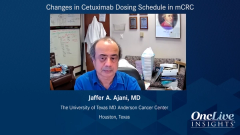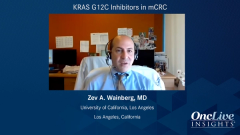
Supplements and Featured Publications
- My Treatment Approach: Colorectal Cancer
- Volume 1
- Issue 1
Selecting Systemic Therapy for Newly Diagnosed mCRC
Treatment approaches available for patients with newly diagnosed metastatic colorectal cancer that is RAS wild type and factors that impact decisions for utilizing a 2-drug versus 3-drug regimen.
Episodes in this series

Zev A. Wainberg, MD: Dr Ajani, if patients get newly diagnosed nowadays, as you know, we have a patient who let’s say has the RAS, RAF, and wild-type status, in your center, how is it determined, should the patient go on, let’s say standard doublet chemotherapy with a monoclonal antibody? Or a triplet chemotherapy, which tends to be FOLFOXIRI [folinic acid, fluorouracil, oxaliplatin, and irinotecan], let’s say, vs the addition of cetuximab or not in RAS wild type?
Jaffer A. Ajani, MD:As you well know, for KRAS wild-type patients, cetuximab or panitumumab with chemotherapy is going to be useful, especially if it is a left-sided tumor. But I think it’s individual preference; there’s no hard and fast rule. I’ll mention this review article that Deborah Schrag, MD, MPH, wrote in JAMA [Journal of the American Medical Association]; it’s a beautifully written paper, where she addresses this kind of issue. But it’s not like a fixed recommendation. There are some studies showing that cetuximab or EGFR inhibition in wild-type KRAS patients could be beneficial. It doesn’t prevent you from using antiangiogenic agents later on.
Zev A. Wainberg, MD: I agree. The field has undergone a lot of changes in the last few years, and one of them is trying to optimize which patients get EGFR antibodies up front. These left-sided KRAS wild-type tumors, which are themselves very discrete from right-sided tumors and their phenotype, are the patients in whom these drugs should be used. We’re learning more and more that in right-sided patients, there’s probably limited benefit to EGFR inhibitors, even in RAS wild-type disease. This is mostly retrospective, but it seems to be very consistent across any of the larger FIRE-3 trials or CALGB 80405 trials, of course, but even more contemporary trials with panitumumab as well. When I think about it, left-sided RAS wild-type tumors are the best bang for your buck of these drugs and almost should be reserved for those patients. When we do see patients with newly diagnosed metastatic colon cancer, we tend to think about that right away, as opposed to waiting for the second or third line, perhaps, like we used to reserve for EGFR antibodies. Some people nowadays regard the response rate as so high that they would even be utilized in patients who are ultimately going to go to the operating room, although that’s been controversial, as you know, with the neoadjuvant use of EGFR antibodies.
Jaffer A. Ajani, MD:I want to ask you a question, when do you select 3 chemotherapy drugs vs 2 chemotherapy drugs?
Zev A. Wainberg, MD: In colon cancer, a lot of people have also started to like FOLFOXIRI [folinic acid, fluorouracil, oxaliplatin, and irinotecan] because there have been more and more randomized data sets and even meta-analyses now showing survival advantages of FOLFOXIRI [folinic acid, fluorouracil, oxaliplatin, and irinotecan] over, in most of the cases FOLFIRI [folinic acid, fluorouracil, irinotecan] is the control arm because those studies were done in Italy. The consistency is there actually, interestingly, and it’s not just clear in which subgroups or not, but it is there. I tend to still use it in younger patients who I feel confident can handle the neutropenia and bone marrow suppression that is going to be induced with 3 cytotoxics, and in patients who need an immediate response, because there your response rate is upward of 70%. For patients who have big bulky primary rectal tumors, or big bulky primary tumors with large bulky liver metastatic disease, I tend to like FOLFOXIRI [folinic acid, fluorouracil, oxaliplatin, and irinotecan] as an upfront regimen. There are even smaller studies, as you know, combining EGFR inhibitors with FOLFOXIRI [folinic acid, fluorouracil, oxaliplatin, and irinotecan], nonrandomized to my knowledge, but they show extraordinarily high response rates in that select group. But if I have a patient with a big bulky tumor, and especially on the younger side, I tend to use FOLFOXIRI [folinic acid, fluorouracil, oxaliplatin, and irinotecan] right away, and I feel increasingly comfortable with that decision, with the more data that come out.
Jaffer A. Ajani, MD: If there’s potentially resectable liver metastasis, like a borderline situation, you would use triple drugs?
Zev A. Wainberg, MD: Yes, but not for too long, we don’t want to introduce CASH [chemotherapy-associated steatohepatitis] or any other issues into the liver. We would probably think about a 3-month course. But yes, if the expectation is that you need that nice response, there’s good evidence that approach works. Also, I saw published last week in JCO [Journal of Clinical Oncology], was the experience with locally advanced rectal cancer, where they randomized patients to the classical chemotherapy radiation, but they used FOLFIRINOX [folinic acid, fluorouracil, irinotecan, oxaliplatin] in France. They showed a very high response rate for locally advanced rectal cancer with a TNT [total neoadjuvant therapy] strategy. I guess the point being is that in that disease there are very high response rates with 3-drug regimens.
Jaffer A. Ajani, MD: Interesting.
Zev A. Wainberg, MD: With EGFR antibodies, here too we’re going to increase response rate in our left-sided wild-type tumors. In someone who’s maybe not as big and bulky, you’re still getting a higher response rate than you are with chemotherapy.
Transcript Edited for Clarity
Articles in this issue
over 4 years ago
Anti-EGFR/Chemo Combos Allow for Tailored Approach in mCRCover 4 years ago
Biweekly Cetuximab Offers a Convenient Dosing Option in mCRCover 4 years ago
Genomics, Sidedness Guide Treatment Selection in Metastatic CRCover 4 years ago
KRAS G12C Inhibitors in mCRCover 4 years ago
Future Directions in mCRCover 4 years ago
EGFR Therapy for mCRC: Dermatologic Toxicityover 4 years ago
Later-Line Treatment Options for mCRCover 4 years ago
Sequencing Anti-EGFR Therapy in mCRCover 4 years ago
Changes in Cetuximab Dosing Schedule in mCRC












































